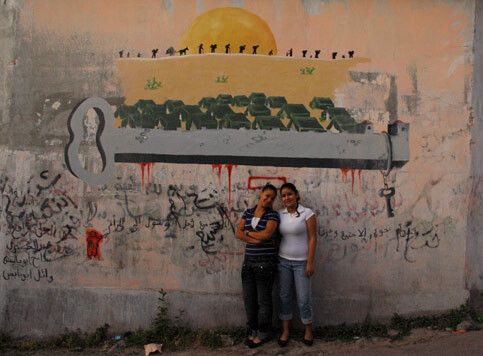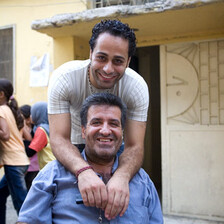The Electronic Intifada 16 September 2007

Haneen Owdeh (left) and Zahra Salem in Dheisheh refugee camp. (Josh Rickard)
“Palestinian girls have a lot of power,” said 17-year-old Haneen Owdeh on a hot summer day in the Dheisheh refugee camp near the West Bank city of Bethlehem. She then added, “but they don’t know how to use it. They need someone to point them to ways on how to use it, to show them what to do.”
Haneen Owdeh and her friends, 18 young Palestinian women in total, aged 16-19, form a grassroots girls’ art collective in the Dheisheh camp, where over 10,000 refugees live on one-and-a-half square kilometers of land. It is not very far from here to their original homes in the villages of the Jerusalem and Hebron districts that were destroyed in 1948 when the Israeli state was established by expelling these youths’ grandparents.
The girls of Dheisheh produce audio journals about their lives. They work under the mentorship of 6+, an American women’s collective whose goal is to empower female artists from different cultural backgrounds. Their audio journals have been exhibited by the 6+ collective around Europe and the US under the title of Turning our Tongues: Audio Journals from the Young Women of Dheisheh refugee camp.
Haneen explains that the themes the girls cover in their recordings vary from love, life, politics and school. However, every subject occurs against the backdrop of the Israeli occupation. “Every girl speaks about the occupation in a personal manner. It’s unavoidable, it’s impossible not to touch upon it, it envelops our lives,” says Haneen.
The conditions in the camp have been strained recently, especially in light of the siege imposed on the Palestinians in the West Bank and Gaza since the election of Hamas in January 2006. The ensuing poverty as well as the political tensions have meant that girls in the camp have very little to do after school in terms of social and artistic activity.
Seventeen-year-old Zahra Salem, another member of the Dheisheh collective, explains that the project drew her in precisely because it offered an opportunity for the girls in the camp to socialize and carve out a niche for themselves amidst continued social upheaval. “This is the first time that there has been a project like this for girls in Dheisheh camp,” she says. “I like this project because we can speak about our lives without restriction, we can express ourselves regardless of what is happening outside. These are our personal journals.”
There were multiple steps to putting together the journals. First, the American women from 6+ taught the young women of Dheisheh how to make paper journals. After each girl wrote out her narrative, she then picked an excerpt to record. Then the girls were taught how to use audio equipment to edit and mix sounds. They worked together to create background sounds to go with each girl’s entry. The finished product is a recording which tries to bring the listener into the girl’s world, to demonstrate how she felt at the moment of the experience.
There were some difficulties involved with setting up the collective, as Haneen explains with a giggle. “When the American women came and said they wanted to do this project with us, it was hard to convince some of the girls to participate. Their parents had their reservations. But after they saw how the girls in the collective were able to work together and work so well and do this, now all the girls ask to participate in the future if we are to do this again!”
Haneen and Zahra say that they and the rest of the Dheisheh collective now want to start up a similar project with a younger generation of women in the camp. They want to take the skills that they learned and use them to help a group of 15-year-old girls produce their own audio journals, which they hope will also be exhibited on the 6+ site. “This project helped us express ourselves, but it also taught us how to work together and how to be good figures for girls in the camp,” said Haneen.
Currently based in Arizona, 6+ member and cofounder Sama Alshaibi, an artist with Iraqi and Palestinian roots, explained that her collective’s main goal in Dheisheh was to empower the young women of the camp. “We wanted to do something on a community level, as teachers and as artists for a demographic that has become completely undeserved,” she said.
Sama says that the interest in Turning our Tongues has been paramount. The journals were recorded last September and were then put on exhibit at a national conference two weeks later. The exhibit has been presented multiple times since then in the US and in Europe. It most recently showed in New York City.
It is quite an accomplishment for the girls from Dheisheh to have their reflections play out around the world through a creative medium whose production they have control over. While 6+ taught the young women in the camp how to create the audio journals and how to function as a collective, Sama is humbled by the experience, explaining that, “in reality, we learned so much more from these girls than we taught them.”
The young girls of Dheisheh would be proud to hear Sama’s assertion. Perhaps their audience from around the world feels that they have as much to learn from them as the women of 6+ did. Such an audience would have been brought one step closer to understanding what it means to be a teenage girl living under occupation, a teenage girl full of power just waiting to be actualized.
Dina Awad lives in Toronto, Canada. Her grandparents hail from Palestine, where she feels most at home.
This article was originally published by Al Wattan and is republished with permission.
Related Links
- http://6plus.org/deheisheh.html
- The unearthing of secrets: Palestinian art, 6+ and a series of transgressions, Mahmanah Farhat (25 April 2007)



